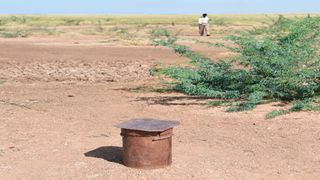
Lotikipi plains in Turkana County on December 19, 2020, where an aquifer was discovered and drilling done. The area is said to have underground water that can serve the country for 70 years but is saline.
| FileTurkana
Premium
Why all is not lost on condemned Turkana aquifer
There is a ray of hope for hundreds of residents of Turkana County after a team of researchers from the University of Nairobi on Saturday declared water from pockets of the condemned Lotikipi aquifer fit for human consumption.
This is after the Ministry of Water last month stopped exploration of the 250 billion cubic metres aquifer, terming it economically unviable due to expected high desalination costs.
The ministry had said it would cost Sh50 million a month on power bills alone to desalinate the water to make it potable.
Sciencedirect.com describes desalination as the process of removing salts or other minerals and contaminants from seawater, brackish water, and wastewater effluent and is an increasingly common solution to obtain freshwater for human consumption and domestic or industrial use.
In the case of Turkana, a test well had been drilled 350 metres underground, confirming that the salt levels were seven times higher than the recommended limit by the World Health Organization (WHO).
The vast reservoir, which was discovered in 2013 together with the Napuu aquifer in Lodwar using satellites and radar, was anticipated to supply the country with water for 70 years when exploited.
In the latest development, scientists, led by Prof Gilbert Ouma, said that the water quality index map recently developed for the Napuu aquifer in Lodwar pointed to the possibility that pockets of non-saline water could be existing given the shared characteristics of the two aquifers.
Non-saline water
"Through a study on the water quality index map, there is reason to believe that we have pockets of non-saline water existing at the Lotikipi aquifer. We need a thorough water quality analysis of different sections of the aquifer to scientifically prove that," Prof Ouma said.
Deputy Governor Peter Lotethiro said the devolved unit was banking on researchers to understand the characteristics of the two aquifers so as to inform investment in their explorations.
"Condemnation by top authorities that the entire Lotikipi aquifer was not fit for human consumption without scientific research findings to back such claims will see potential investors hoping to invest in desalination or mega irrigation projects keep off," Mr Lotethiro said.
In May 2019, the county government kicked off talks with a private investor, Systel Engineering, to desalinate the Lotikipi aquifer in Turkana West sub-county near the Kenya-South Sudan border.
The talks were meant to explore the viability of the investment that was critical in providing water for domestic use and crop and livestock production.
Governor Josphat Nanok, who welcomed Systel Engineering, noted that desalination is an expensive process that the county government cannot do alone and support from the national government and private investors was welcomed.
Desalination
"There is a huge demand for water for domestic use, irrigation and for our livestock. Desalination of the aquifer will be a great milestone," Governor Nanok said.
He added that easy access to water for pastoralists will support efforts to commercialise pastoralism by providing water and alternative pasture.
Water Services executive Vincent Palor said the use of an evidence-based approach to inform policy and practice will tackle the perennial water shortages in the arid county.
Mr Palor said that the devolved unit had stepped up its efforts to address perennial water supply interruptions in Lodwar, part of which is served by the Napuu aquifer.
He noted that recommendations from a joint research programme by the University of Nairobi and the University of Oxford have revealed that building climate-resilient systems, reducing water access inequalities, focusing on water quality and strengthening institutions was key in ensuring water security.
"We are focusing on bridging funding gaps as a key ingredient in improving water supply for the fast-growing Lodwar municipality and upcoming urban centres," he said.
Mega projects
He added that they are banking on research to find a lasting solution to the water supply interruptions caused by increasing demand for water arising from urbanisation due to devolution and infrastructure development, as well as anticipated mega projects like the Lamu Port-South Sudan-Ethiopia Transport (Lapsset) Corridor.
Ministry of Water, Sanitation and Irrigation Principal Secretary Samuel Alima said the water in the aquifer could not be used even for oil exploration because of high levels of salinity.
Turkana West MP Daniel Epuyo said that when he toured the Lotikipi plains with Deputy President William Ruto in 2019, they understood that water scarcity is a critical issue for locals near the aquifer.
Mr Epuyo said the main reason they visited the remote region was for the Deputy President to appreciate the expansiveness of the Lotikipi aquifer area so that the national government could see the need for allocating more resources to dig more boreholes for residents.
“The Ministry of Water should continue carrying out more water aquifer testing because the whole of the aquifer has only one borehole that is being relied on to test the water quality and to condemn the whole aquifer," the MP said.





